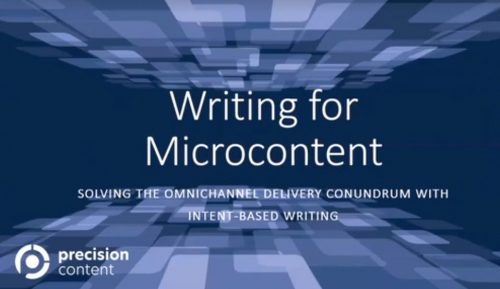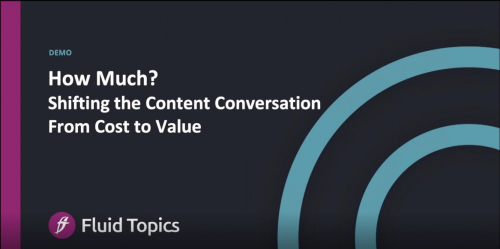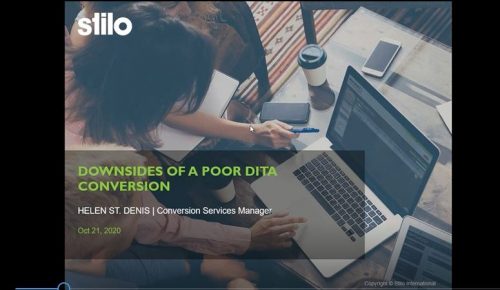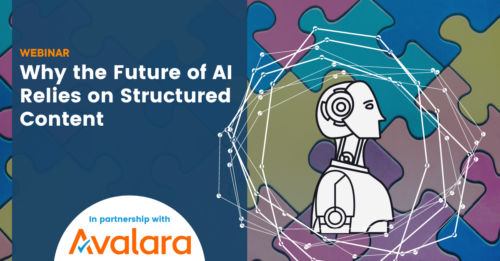-
June 2, 2021 Various surveys are showing that the majority of the world’s leading companies have accelerated their digital transformation efforts during the pandemic – efforts that are not slowing down. This presentation will discuss the key role content plays in the field of digitalization, and what you should do to future proof your content while elevating your customer experience. Presented by: Berry Braster has been in the technical documentation field for over 18 years and has helped implement content strategies, including the use of DITA and HyperSTE controlled language software. As Technology Director, Berry is involved with connecting technical documentation to IoT, and how to leverage on technologies like Augmented and Virtual Reality.
-
May 19, 2021 Omnichannel experience is setting the bar for customer expectation and it’s putting new and increasingly complex demands on your business to deliver the right information where your customers need it. Writing for the web is not writing for omnichannel. Preparing your content for emerging technologies requires new approaches to content creation and delivery. It requires a microcontent strategy. Robust content management technology is certainly part of the solution, and your organization will be tempted to invest in new tools for chatbots and voice. However, before you go ahead and fill yet another content silo with zettabytes of information, instead make enhancements to the content creation programs you already have. Microcontent is the next evolution in structured authoring and will open new channels for your content while improving delivery across existing channels. In this session, we will focus on the missing link in a successful microcontent strategy: an intent-based writing methodology. We will highlight some key concepts that will help you to start looking at your content through an omnichannel lens. Presented by: Mike Rowlinson is the VP of Training & Content Services at Precision Content. Mike has been working in the technical communications industry since 2005. His core belief is that great content enables great companies. Mike’s division develops and delivers engaging and effective training and transformation engagements including the recent completion of the firm's eLearning product, the 15 modules self-paced, Precision Content® Writer Training. The training enables writers to create effective content so that staff and customers alike can find what they need and understand what's required quickly and efficiently.
-
April 14, 2021 Unsurprisingly, when it comes to the money your company spends producing technical documentation, your management knows the cost down to the penny. And when it comes to investing in THE content delivery solution that will streamline your work process, unleash your content, and transform your user experience, one question will arise without a doubt: “How much?” Meaning: “How much will it cost?" This can be a completely different conversation if you can turn it into “how much it will save” and “how much additional revenue it will bring to the company." In this webinar, we will give you a clear picture of the cost savings and gains a content delivery platform such as Fluid Topics can generate across three areas: customer and partner service, employee productivity, and client satisfaction. We will also give you access to a tool that will help you navigate scenarios and determine how long it will take to achieve a return on your investment by customizing the calculator’s numbers to fit your situation. Presented by: Geraldine Boulez is passionate about new technologies and their ability to solve people and business problems. This is what has led her to product management, marketing and business development positions in fast-growing tech companies and innovative corporations for over twenty years. Geraldine is VP of Marketing at Fluid Topics, the leading Content Delivery Platform that reinvents how users search, read and interact with technical documentation.
-
October 21, 2020 Thinking of automating your entire conversion process to DITA? Wanting to handle conversion work manually, in-house? Before you proceed, think about how the conversion could help you derive the benefits of DITA that you expect. A simplistic approach may allow you to publish something that looks just like what you have now. But a really good quality conversion will help you to leverage content reuse, personalization and multi-channel publishing, as well as making it easier to maintain and update your content. For example, will your conversion generate keys and keyrefs for variables? How about a relationship table, to prevent broken links? Will menu cascades be correctly marked up, for localization purposes? Presented by: Helen joined Stilo as a technical editor. She now works closely with Stilo Migrate customers, helping them to analyze their legacy content and configure appropriate mapping rules. She also provides Migrate customer training and support. Helen has helped Migrate customers to convert tens of thousands of pages of content to DITA and custom XML. Helen holds a Bachelor of Arts in English from St. Francis Xavier University in Antigonish, Nova Scotia, and has pursued graduate studies at Queen’s University in Kingston, Ontario.
-
Recorded on: March 27, 2024

DITA is a fantastic tool for authoring efficiency and content management. It might as well be the keystone for outstanding content experiences, like content personalization and multi-channel delivery. But caution! What was thought for content creation is not always the right fit for modern content publishing.
Drawing from his experience as a content expert and senior consultant at Fluid Topics, Gaspard Bébié-Valérian will address in this webinar the specifics for content delivery of two key elements, metadata and granularity, and how to enrich and optimize them to build exceptional experiences with your DITA content.
Don’t miss the opportunity to delve into practical use cases encountered during real-life implementations and gain insights to enrich your own content strategy."
Presented by Gaspard Bébié-Valérian At the crossroads of engineering and social sciences, Gaspard enjoys exploring the breadth of technologies involved in technical documentation, including structured documentation, CCMS, and DITA-OT. Gaspard works as content expert and senior consultant at Fluid Topics, helping clients get the most out of their Content Delivery Platform.
At the crossroads of engineering and social sciences, Gaspard enjoys exploring the breadth of technologies involved in technical documentation, including structured documentation, CCMS, and DITA-OT. Gaspard works as content expert and senior consultant at Fluid Topics, helping clients get the most out of their Content Delivery Platform. -
Recorded on February 7, 2024
 When should regression testing be performed?
Regression analysis of PDFs allows you to test system changes, changes to CMS, changes to stylesheet, changes to formatting software, and changes to graphic software.
Regression testing should take place anytime your system, hardware, or software changes to determine if what was correct in the output is still correct in output. Changes may result in content disappearing, incorrect formatting, changes to the integrity of images and tables, and many other (sometimes subtle) issues that invalidate the reliability of the document.
Antenna House Regression Testing System is for Automated – Fast – Accurate PDF to PDF & Image to Image Visual Comparisons
When should regression testing be performed?
Regression analysis of PDFs allows you to test system changes, changes to CMS, changes to stylesheet, changes to formatting software, and changes to graphic software.
Regression testing should take place anytime your system, hardware, or software changes to determine if what was correct in the output is still correct in output. Changes may result in content disappearing, incorrect formatting, changes to the integrity of images and tables, and many other (sometimes subtle) issues that invalidate the reliability of the document.
Antenna House Regression Testing System is for Automated – Fast – Accurate PDF to PDF & Image to Image Visual Comparisons
Presented by Michael Miller

Michael Miller is Vice President of Antenna House, Inc., a company that has developed one of the leading standards‐based (XSL‐FO and CSS) document formatting software products on the market today. Michael has a degree in Printing Engineering and Management and has been involved in high‐end composition, document formatting, and document management for over 40 years. He has an extensive background with structured data, including SGML, XML, S1000D, and DITA. During his career, he has worked in Europe and North America and has been involved in the implementations of some of the largest fully automated publishing and document formatting projects.
-
Recorded on: February 8, 2024
 Presented by: André Schlotz, RWS; Hareesh K, Sandvik Mining and Construction GmbH; and Harald Stadlbauer, MD, NINEFEBLearn how Sandvik Mining and Construction makes their DITA-based technical content fit to support their global servitization strategy. For many years Sandvik is creating, managing, translating, and publishing conditionalized DITA content with RWS technology and services. This content has been created with a “Safety First” approach and published as PDFs. Sandvik`s new digital service offerings – enabled through connected products - require customers and service technicians to retrieve personalized and relevant information components through their Web-based aftersales application My Sandvik / SmartMate with the new paradigm: provide the right information, for the right use case at the right time. To enable this a semantic data layer has been implemented combining existing taxonomies, product-structures and iiRDS. DITA topics are now tagged by taking advantage of the Semantic AI capabilities – so called “Smart Tagging”. The hereby created smart content components are then delivered and exposed in a content-as-a-service approach.
Presented by: André Schlotz, RWS; Hareesh K, Sandvik Mining and Construction GmbH; and Harald Stadlbauer, MD, NINEFEBLearn how Sandvik Mining and Construction makes their DITA-based technical content fit to support their global servitization strategy. For many years Sandvik is creating, managing, translating, and publishing conditionalized DITA content with RWS technology and services. This content has been created with a “Safety First” approach and published as PDFs. Sandvik`s new digital service offerings – enabled through connected products - require customers and service technicians to retrieve personalized and relevant information components through their Web-based aftersales application My Sandvik / SmartMate with the new paradigm: provide the right information, for the right use case at the right time. To enable this a semantic data layer has been implemented combining existing taxonomies, product-structures and iiRDS. DITA topics are now tagged by taking advantage of the Semantic AI capabilities – so called “Smart Tagging”. The hereby created smart content components are then delivered and exposed in a content-as-a-service approach.
André Schlotz is VP Global Automotive and Manufacturing Solutions, RWS Group. He helps organizations to digitalize their content supply chain through structured content authoring, component content management and single source content delivery. Before joining RWS in 2013 he was holding various management positions in manufacturing companies in product development, aftersales, process organization and IT. He has more than 20 years of experiences in process consulting, planning, building and running digital industry solutions.
 Hareesh Kanakaswamy is the Portfolio Manager of Digital Services Solutions at Sandvik Mining and Construction G.m.b.H. With 14+ years of experience in product development and aftermarket operations, he specializes in constructing end-to-end digital ecosystems for servitization strategies. Hareesh is a firm believer in innovation as the key to sustainable progress for humanity.
Hareesh Kanakaswamy is the Portfolio Manager of Digital Services Solutions at Sandvik Mining and Construction G.m.b.H. With 14+ years of experience in product development and aftermarket operations, he specializes in constructing end-to-end digital ecosystems for servitization strategies. Hareesh is a firm believer in innovation as the key to sustainable progress for humanity.
 Harald Stadlbauer, MD is General Manager of the NINEFEB Group of companies, dedicated to the advancement of Technical Communication, like Technical Documentation as well as eLearning to the intelligent delivery of it. He is actively engaged in developing iiRDS further as well as contributing to the AAS (Asset Administration Shell) sub-models of the IDTA (Industrial Digital Twin Association)
Harald Stadlbauer, MD is General Manager of the NINEFEB Group of companies, dedicated to the advancement of Technical Communication, like Technical Documentation as well as eLearning to the intelligent delivery of it. He is actively engaged in developing iiRDS further as well as contributing to the AAS (Asset Administration Shell) sub-models of the IDTA (Industrial Digital Twin Association)
-
Recorded on: January 24, 2024

Improve Efficiency and Reduce Risk with High-Quality Componentized Content
Presented by: Chris Carroll, Acrolinx; Mike Iantosca, Avalara; and Dipo Ajose-Coker, Madcap SoftwareIn this webinar, we’ll dive into the strategies and practical solutions to help technical writing teams and enterprise content owners to improve editorial workflows and manage the risks associated with generative content. In this session we’ll discuss:- Why enterprises should consider relational componentized content
- Recommendations enterprise content teams should follow to measure success
- How Avalara is increasing content efficiency and customer experience
 Chris Carroll is Director of Product Marketing at Acrolinx.
Chris Carroll is Director of Product Marketing at Acrolinx.
 Mike Iantosca is Senior Director of Content Platforms at Avalara.
Mike Iantosca is Senior Director of Content Platforms at Avalara.
 Dipo Ajose-Coker is Product Marketing Manager at MadCap Software.
Dipo Ajose-Coker is Product Marketing Manager at MadCap Software.
-
Recorded on February 28, 2024
 For beginners in DITA XML or for those dealing with ongoing content migration, we provide an easy solution to get up-and-running with your own customized conversion pipeline using our automated Migrate SaaS tool. Register to attend a short 45-minute demo with Stilo’s CTO, Jackson Klein, to learn how this can be accomplished.Presented by: Jackson Klein, Stilo
For beginners in DITA XML or for those dealing with ongoing content migration, we provide an easy solution to get up-and-running with your own customized conversion pipeline using our automated Migrate SaaS tool. Register to attend a short 45-minute demo with Stilo’s CTO, Jackson Klein, to learn how this can be accomplished.Presented by: Jackson Klein, Stilo Jackson has more than 20 years of technical leadership, strategic direction and oversight for successful planning and execution of all stages of R&D, product development and lifecycle. He is responsible for developing and championing Stilo’s technology strategy across all functions of the organization and contributing to Stilo’s long-term vision.Prior to joining Stilo, Jackson managed and led R&D teams to develop and successfully launch software products in the field of design, simulation and analysis of photonic integrated circuits, communication systems and networks. Jackson holds a M.S and a Ph.D. in Electrical and Computer Engineering from State University of Campinas, Brazil and an MBA from the University of Ottawa.
Jackson has more than 20 years of technical leadership, strategic direction and oversight for successful planning and execution of all stages of R&D, product development and lifecycle. He is responsible for developing and championing Stilo’s technology strategy across all functions of the organization and contributing to Stilo’s long-term vision.Prior to joining Stilo, Jackson managed and led R&D teams to develop and successfully launch software products in the field of design, simulation and analysis of photonic integrated circuits, communication systems and networks. Jackson holds a M.S and a Ph.D. in Electrical and Computer Engineering from State University of Campinas, Brazil and an MBA from the University of Ottawa. -
January 17, 2024 9:00 am – 10:30 am PT | 12:00 pm – 1:30 pm ET | 5:00 pm – 6:30 pm GMT

Far too often, GenAI projects are considered the exclusive realm of IT, while Knowledge and Content Development teams remain in the background. Unfortunately, this approach often leads these projects to failure.
Presented by Fabrice Lacroix, Lief Erickson, and Amber Swope
Join us for an insightful webinar exploring why content developers and information architects must be at the forefront of GenAI Projects. Discover how their expertise and insights propel AI initiatives, transforming content into dynamic, user-centric solutions. Learn why empowering content specialists with GenAI projects is critical for fostering innovation and enhancing customer experiences.
This webinar is presented by Amber Swope DITA specialist at DITA Strategies, Lief Erickson, Principal Consultant at Intuitive Stack, and Fabrice Lacroix, CEO and founder of Fluid Topics.
Fabrice Lacroix is a serial entrepreneur and a technology pioneer. He has been working for 25 years on the development of innovative solutions around search technology, content enrichment and AI. He is the founder of Fluid Topics, the leading Content Delivery Platform that reinvents how users search, read and interact with technical documentation.
 Lief Erickson is co-founder of Intuitive Stack, a content strategy consultancy. He holds a master’s degree in Content Strategy from FH Joanneum (Austria), where he teaches information architecture. ContentOps, taxonomies, and search are leading interests for Lief, who has held positions as a tech writer and IA.
Lief Erickson is co-founder of Intuitive Stack, a content strategy consultancy. He holds a master’s degree in Content Strategy from FH Joanneum (Austria), where he teaches information architecture. ContentOps, taxonomies, and search are leading interests for Lief, who has held positions as a tech writer and IA.
 Amber Swope is an internationally recognized Information Architect, DITA expert, and IA consultant. With over 20 years of information development experience and 15 years of DITA expertise, Amber specializes in helping organizations create opportunity through IA.
Amber Swope is an internationally recognized Information Architect, DITA expert, and IA consultant. With over 20 years of information development experience and 15 years of DITA expertise, Amber specializes in helping organizations create opportunity through IA. -
Recorded on January 11, 2024

There are many different situations when you might convert content from one form into another, from a one-off migration project, converting everything from a legacy format into an open XML standard, all the way to regularly converting third-party content to bring it into your internal CMS. The tools used to convert vary. Maybe you’re using a vendor to convert content for you, or perhaps you wrote your own XSLT suite, which you manage in-house. Whichever route you take and whatever the purpose of your conversion, there is always a risk that content may be lost or corrupted during conversion. In this webinar, Tristan from DeltaXML will walk through some of the pitfalls of content conversion and show how their new tool, ConversionQA, can help you ensure that your content conversion hasn’t misplaced a single character.
Presented by: Tristan Mitchell, DeltaXML Tristan is Product Director at DeltaXML, a technology company with world-leading software products for the management of change in structured content. He has a deep understanding of DeltaXML’s product suite and loves to help customers create extra value in their content using change management. Tristan is a father to three daughters, a movie lover, and a keen runner.
Tristan is Product Director at DeltaXML, a technology company with world-leading software products for the management of change in structured content. He has a deep understanding of DeltaXML’s product suite and loves to help customers create extra value in their content using change management. Tristan is a father to three daughters, a movie lover, and a keen runner.
-
Recorded on December 6, 2023
 Join us for an exciting journey into editorial efficiency with our industry wizards. We’ll unveil the secrets to success throughout your editorial process, especially in a world where Generative AI has become a transformative force in content creation. In this dynamic session, we’ll explore the following fundamental points:
Join us for an exciting journey into editorial efficiency with our industry wizards. We’ll unveil the secrets to success throughout your editorial process, especially in a world where Generative AI has become a transformative force in content creation. In this dynamic session, we’ll explore the following fundamental points:
- How to streamline editorial processes to increase efficiency.
- Why governance is an essential factor in mitigating the risk of using generative AI for content creation.
- How to establish automated quality gates throughout the content supply chain.

 Peter Tauter, our Vice President of Product Management, is a seasoned professional with a background in computational linguistics, AI, and computer science. With 20+ years in B2B software development and product management, Peter is passionate about technology and how it can improve lives.
Peter Tauter, our Vice President of Product Management, is a seasoned professional with a background in computational linguistics, AI, and computer science. With 20+ years in B2B software development and product management, Peter is passionate about technology and how it can improve lives.
His expertise as an engineer and product strategist is evident in his track record of creating impactful solutions that benefit both businesses and individuals. Peter's commitment to innovation and user-centric technology is a driving force in our organization. Beyond the boardroom, he brings a unique touch of joy – not only can he lead in product creation, but he can also lead on the dance floor, mastering the art of a swing out.












